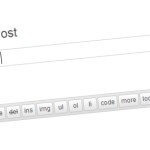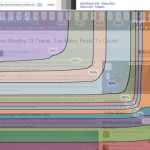Bloggers are constantly evolving, learning new skills, adapting in order to survive online. This gives them skills that you can only really learn by trial and error. It takes hard work, dedication and not much time for naval gazing.
Multi-Skilled
To be a great blogger you need to be multi-skilled in a number of different areas such as writing, web editing, networking, SEO and marketing just to name a few. One useful outlet for any blogger is social media. It provides a key channel to distribute content and engage with your audience and peers online. It hasn’t always been around in the same fast paced environment we are used to today and many travel bloggers who have been blogging for a while are all too familiar with evolving, adapting and learning new skills to survive.
Social Media is fundamental to online publishing
Social media is a fundamental channel in online publishing. It serves as a perfect place to distribute good quality content as it floats to the top of the pile by way of sharing, liking, plus one’ing etc. It’s become such an important aspect for gauging how good a piece of content is that even Google are seemingly desperate to add a human element to their search algorithm. Social media sharing is a great indicator of quality content and one that is much harder to “game” unlike obtaining back links from external websites.
For any online writer it is crucial to be active and engaged in these channels in order for their content to have an audience. Writers ignoring such channels could be left behind as others will have developed authority and audiences that are key to success online. Content is moving to the cloud, social media outlets will form the distribution channels and systems to identify quality content by way of voting. Online writers should be embracing these new channels as part of their tool set for reaching and engaging with audiences.
Criticism of bloggers – quality content
Recently there has been some criticism of travel bloggers for navel gazing and generally about the poor quality of their content. I disagree that this is the case. I’ve seen bloggers content improve vastly in the six years I’ve been blogging. Not only has their content improved but their web design and complete offering has taken a much more professional turn.
On the other hand I was amazed to learn recently that on many journalism courses, blogging, social media and online publishing isn’t taught. Surely it should be a basic requirement to have a blog and twitter account at least? Where is the social media element of the course? Where’s the study of online quality content? Where are they being taught to deal with writing for an online audience? Search engine basics? Analysing website statistics to see what users are really engaged by?
It’s often cited that quality content will shine through. This is true but not entirely, quality content is only one small aspect of the whole armory of publishing online. What is also usually left undefined is the question of what is quality content online? For me quality content online can be vastly different to that of print media yet many still believe that writing in the same style is indeed quality content.
Many bloggers are becoming skilled in analysing website statistics, seeing what content works and what doesn’t and by trial and error these bloggers are gaining skills that aren’t even seemingly brushed upon on today’s journalism courses.
What is Quality Content?
Time and time again I read that quality content will win the day but what is quality content? I think there is a misconception amongst some that quality content is a gauge of how good your writing is. Of course quality content is subjective and dependant upon your audience. I’ve heard it stated in annoyance towards travel bloggers that travel writing is not about “me” but about “the place”. I’d actually disagree and say that online travel writing is in fact not about “the place” not about “me” but about “the user”. To survive online you have to give the user what they want, bloggers tend to learn this by trying new content types/topics and adapting.
The user, your audience is often not another journalist or blogger. Do they really want an in-depth article all about what you did in the blogger style of “I went here, I did this”? Equally, do they want a whimsical ten page piece about “the place”? It’s something that should be considered by any online writer, what content types work for your audience. Analytics should be studied to see what works and what doesn’t. These content types and topics are where you will find your quality content. Your traffic to time on page ratio are also clear indicators of how well your piece works online. It’s great to get a viral, shareable article but if users aren’t engaged by it then you have only won half the battle. Get both engagement and a viral element and you are producing quality online content.
However, I do believe travel bloggers should be careful not to focus too much on one area such of networking and marketing without supporting it with quality in terms of website design and quality content. Perhaps this is what most people are referring to when they say that those who produce quality will be successful when the bubble bursts. It’s not good enough to be great at marketing yourself and knowing the right people if your product is not up to scratch, in the long term the product with stand the test of time.
Online vs Print Content
There’s been much research into users attention spans online and it’s often argued that readers will scan an article before reading or even bookmarking. This is one reason why it’s important to give a general overview of what your article talks about in the first hundred words. Not only so that users can get a good idea of what the article is about but also so that the likes of Google, Bing etc get an understanding that your page title , heading and first paragraphs are talking about a relevant topic.
Say for example you have a heading and page title of “My Favourite Pizza” but your first 100 words are a metaphor talking about monkey’s in a zoo, search engines and users are going to have a hard time figuring out what the overall article covers. The outcome being that the user may leave (page will have a high bounce rate) and the search engine is less likely to rank your article for anything to do with “favourite pizza”. The rules for writing online are different and universities, colleges and courses should be evolving with these changes.
Trainee journalists should be embracing the blogging world and those that do are likely to be much better equipped for where the industry is heading in the future. Those that ignore it and cite their quality writing as the one thing that will make them successful are burying their heads in the sand and ignoring the skills that will help them in the future.
It’s easy to criticize bloggers but it’s important to remember that most of these people work extremely hard to: adapt, learn, evolve and build an audience of their own. Not only that, but they are very self motivated. If travel bloggers didn’t have these traits they wouldn’t survive. Savvy trainee journalists that embrace social media and all the elements that are a bi-product of blogging will be better equipped for the future online publishing world.
Photo by west.m






